The low brake performance you mentioned has nothing to do with the rotors. It has to do with the legal ramifications of using undersize parts.
First, to answer your immediate question, yes, you can just install new brake pads. That is what a lot of uninformed do-it-yourselfers do. That alone will not cause a problem because in theory you have all the same parts you had yesterday, except the linings are better. I should say, ... Different.
New is not necessarily better. Part of the brake performance comes from dissipating heat buildup to prevent brake fade. Thinner rotors have less mass so their temperature will rise faster. When the two front rotors are substantially different thicknesses the temperature of the thinner one will rise faster. The two sets of pads will have different coefficients of friction and will stop unevenly. More on that when I discuss the legal issues.
Understand that no professional will just slap in new pads, then expect you to come back later to have the rest of the job done. They know they have to charge you labor both times and it doesn't make sense to take everything apart twice. You are assuming though that the rotors need to be replaced. It is normal to machine old rotors on a brake lathe to make them true and the two sides perfectly parallel. Some large and some very small grooves wear into all rotors, and the linings wear to match those grooves so they make 100 percent contact. THAT is where the best performance comes from. When you just install new linings they have to wear down to match those high and low spots. That can take thousands of miles.
When used rotors are machined they end up with grooves so even though they're flat, they aren't perfectly smooth. The pads will only touch the high spots so braking performance will be very poor. That typically improves after about 100 miles, and most shops will tell you to take it easy at first with your new brakes. Even new rotors are relatively rough at first. The best braking performance occurs when the pads and rotors have perfectly mating surfaces.
What you need to do is take the old rotors to the auto parts store where you're buying the new pads and have them measure the thickness and suitability for machining. They will look up the published legal specs and will not machine them if they are or will end up being too thin. Machining them is not expensive. In fact, new rotors are very inexpensive compared to 20 years ago. A pair will cost a lot less than a tank of gas, so if you can't afford to do the job the way a professional would, you can't afford to drive the car either.
To shift to a different area of concern for a minute, insurance investigators and lawyers love to find things like altered ride height, offset wheels, modifications to the electrical system, and do-it-yourselfer brake repairs. In the case of suspension modifications and brakes, they WILL convince a jury that you were partly at fault for the crash when the other guy ran the red light, because you were less able to avoid it, and they will be right. No one wants to be sitting in a courtroom explaining why you knowingly put undersize rotors on the car or slapped new pads on without machining the rotors. That is why no professional will machine them if they're undersize and no one will do work that could put them in the courtroom.
That said, there are a real lot of other things professionals do and don't do to prevent noises and vibrations, and to make the new pads last longer. The edges of the new linings have to be prepared to reduce their tendency to squeal. The piston surface and caliper fingers that contact the pad backing plates have to be cleaned to insure they make full and solid contact with those pads. High-temperature brake grease is used there and on the caliper slides and mounts. You have to check that no debris like rust and scale gets stuck between a rotor and hub or between the rotor and wheel.
So you can just pop in new pads but you have to weigh the risk of defending your actions to a lawyer. I'm the world's expert at getting the last ounce of life out of everything I own and drive, but I would never compromise my brake, suspension, steering, and exhaust systems.
SPONSORED LINKS
Friday, May 3rd, 2013 AT 5:47 PM



